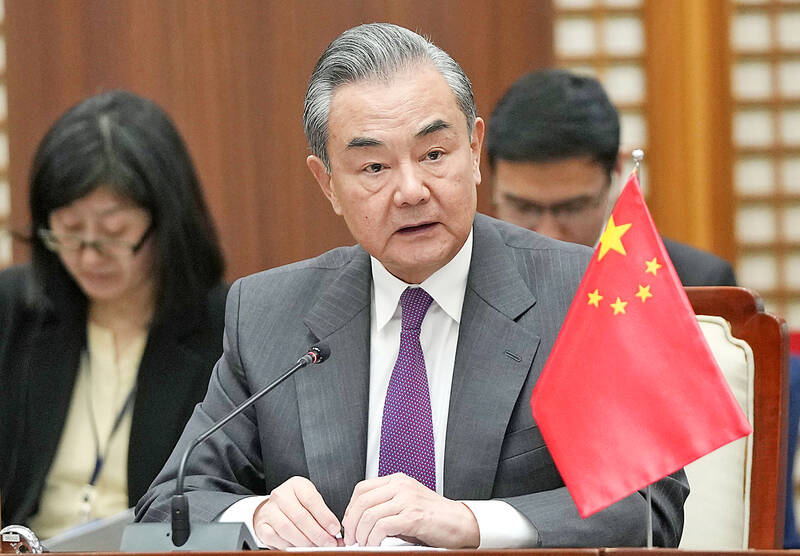Beijing is to maintain military pressure on the Philippines amid a dispute over sovereignty in the South China Sea, Chinese Minister of Foreign Affairs Wang Yi (王毅) said on Wednesday.
In a phone conversation with the Philippine Secretary of Foreign Affairs Enrique Manalo, Wang “warned that if the Philippine side misjudges the situation, goes its own way or even colludes with ill-intentioned external forces to continue to stir up troubles, China will defend its rights in accordance with law and respond resolutely,” Chinese state-run Xinhua news agency reported.
Wang’s comments follow China’s mobilization of its coast guard and maritime militia to block Philippine supply missions to support its soldiers and fishers. China claims sovereignty over virtually the entire South China Sea, one of the world’s most crucial waterways for shipping, putting it at odds with the Philippines, Taiwan, Vietnam, Malaysia and Brunei.

Photo: AP
Wang was quoted as saying the Philippines was “changed its policy stance so far, reneged on the promises it has made, provoked troubles at sea, and undermined China’s legitimate and lawful rights.”
“Noting that the bilateral relationship now stands at a crossroads, with its future yet to be decided, Wang said the Philippine side must act with caution,” Xinhua reported yesterday.
“Instead of continuing in the wrong direction, the Philippine side should return to the right path as soon as possible, with properly handling and managing the current maritime situation as a top priority,” Wang was quoted as saying.
Wang gave no details on what agreements Manila had allegedly abandoned.
Manalo’s office described the the conversation as a “frank and candid exchange,” saying the sides had reached a “clearer understanding of our respective positions on a number of issues.”
Territorial disputes have grown tenser as China seeks to cement its territorial claims in defiance of the US and its allies, the Philippines, Japan, South Korea and close partner Taiwan.
The head of the Philippine military was with his forces aboard a supply boat when it was blasted with a water cannon, surrounded and bumped by Chinese coast guard ships earlier this month in the disputed South China Sea.
China, meanwhile, accused the US of encouraging the Philippines, its treaty ally, to provoke China for its own purposes, though it provided no direct evidence.
Along with using water cannons, Philippine officials said that Chinese coast guard ships used a military-grade laser that caused Filipino crew members temporary blindness, and engaged in dangerous blocking and shadowing maneuvers that caused minor collisions.
Washington is bound by a 1951 treaty to help defend the Philippines from attack. That pledge has grown stronger with the election of Philippine President Ferdinand Marcos Jr, who recently said that the situation in the South China Sea “has become more dire” as China expands its presence.
China has showed interest in atolls and shoals that are “closer and closer” to the coast of the Philippines, with the nearest atoll about 60 nautical miles (111km) away, Marcos said during a visit to the US state of Hawaii last month.

SECURITY: As China is ‘reshaping’ Hong Kong’s population, Taiwan must raise the eligibility threshold for applications from Hong Kongers, Chiu Chui-cheng said When Hong Kong and Macau citizens apply for residency in Taiwan, it would be under a new category that includes a “national security observation period,” Mainland Affairs Council (MAC) Minister Chiu Chui-cheng (邱垂正) said yesterday. President William Lai (賴清德) on March 13 announced 17 strategies to counter China’s aggression toward Taiwan, including incorporating national security considerations into the review process for residency applications from Hong Kong and Macau citizens. The situation in Hong Kong is constantly changing, Chiu said to media yesterday on the sidelines of the Taipei Technology Run hosted by the Taipei Neihu Technology Park Development Association. With

CARROT AND STICK: While unrelenting in its military threats, China attracted nearly 40,000 Taiwanese to over 400 business events last year Nearly 40,000 Taiwanese last year joined industry events in China, such as conferences and trade fairs, supported by the Chinese government, a study showed yesterday, as Beijing ramps up a charm offensive toward Taipei alongside military pressure. China has long taken a carrot-and-stick approach to Taiwan, threatening it with the prospect of military action while reaching out to those it believes are amenable to Beijing’s point of view. Taiwanese security officials are wary of what they see as Beijing’s influence campaigns to sway public opinion after Taipei and Beijing gradually resumed travel links halted by the COVID-19 pandemic, but the scale of

A US Marine Corps regiment equipped with Naval Strike Missiles (NSM) is set to participate in the upcoming Balikatan 25 exercise in the Luzon Strait, marking the system’s first-ever deployment in the Philippines. US and Philippine officials have separately confirmed that the Navy Marine Expeditionary Ship Interdiction System (NMESIS) — the mobile launch platform for the Naval Strike Missile — would take part in the joint exercise. The missiles are being deployed to “a strategic first island chain chokepoint” in the waters between Taiwan proper and the Philippines, US-based Naval News reported. “The Luzon Strait and Bashi Channel represent a critical access

Pope Francis is be laid to rest on Saturday after lying in state for three days in St Peter’s Basilica, where the faithful are expected to flock to pay their respects to history’s first Latin American pontiff. The cardinals met yesterday in the Vatican’s synod hall to chart the next steps before a conclave begins to choose Francis’ successor, as condolences poured in from around the world. According to current norms, the conclave must begin between May 5 and 10. The cardinals set the funeral for Saturday at 10am in St Peter’s Square, to be celebrated by the dean of the College